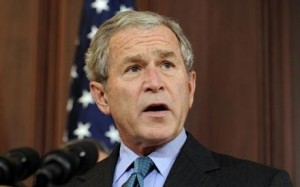Is It Fair to Blame George W. Bush for the Ailing Economy?

The much-anticipated May jobs report revealed disappointing news. While 69,000 jobs were created, the unemployment rate inched up from 8.1% to 8.2%. The reaction from Democrats and Republicans has been predictable.
Maryland Democratic congressman Chris Van Hollen chastised Jeb Bush at a House hearing for never challenging his brother's administration on economic policy while presumptive Republican presidential nominee Mitt Romney read the tea leaves to say, "It is now clear to everyone that President Obama's policies have failed to achieve their goals and that the Obama economy is crushing America's middle class."
The report also comes on the heels of the unveiling of George W. Bush's official presidential portrait at the White House and the relation of the portrait to the jobs report is impossible to miss.
It's no secret that Bush has kept a low profile since leaving office. His absence brings to mind former Vice President Richard Nixon's quip about his 1962 California gubernatorial loss: "You won't have Nixon to kick around anymore."
Slowly but surely though, Bush is coming back. A few weeks ago he gave a speech at the newly-christened Bush Center at Southern Methodist University, weighing in on the so-called Arab Spring. Although openly campaigning for Romney may be a bridge too far at this point, Bush is coming back.
Speaking on the radio Thursday with KMOX's Mark Reardon, National Review editor-at-large Jonah Goldberg described the Tea Parties partly as the "delayed backlash" against the Bush administration's domestic spending:
"A lot of conservatives gave Bush a pass because they found him to be an honorable man, they found his enemies to be so dishonorable and we were at war and so you had to prioritize where you were going to pick your political battles. But there was just an enormous frustration with the amount of money that was spent, particularly by the Republican congress under George W. Bush, and then the Tea Parties were asked to defend John McCain, who was another sort of big government conservative, so when Obama came in the Tea Parties had a free hand to finally say, 'O.K., look, enough is enough, I'm not going to hold my nose anymore.'"
What Goldberg means by "dishonorable enemies," whether Islamic terrorists or the Democrats (or dissenting conservatives) is unclear, but his tale is one of convenience: there is nothing troubling about Republicans protesting excessive domestic spending as long as the target of their "delayed backlash" can no longer be politically punished.
But that's the problem with such partisan double standards. Obama may go down to defeat this November because his economic policies have not adequately resuscitated the economy. But the independent-minded voter should be able to tell that Obama's failures do not exalt Bush's accomplishments.
Historian Timothy Stanley wonders if history might be as kind to Bush as it has been to once fellow cellar-dwelling president Harry Truman:
"As memories fade and new reasons to be angry take their place, Bush's time in office might start to look comparatively benign. . . ."Still, historical distance from Bush's presidency will let us put it in greater perspective. Subjective bad memories will be replaced by objective analysis. And, objectively, he was a very important president."
Although Bush's presidency was important in the sense that much of consequence happened, conservatives should hope that it is not fondly remembered. For Bush to go down in history as an admirable president is for the failures of 9/11, the Patriot Act, the invasions and volatile occupations of Afghanistan and Iraq, the trillions of new unfunded liabilities, bureaucratic failings after Hurricane Katrina, and the bailout of the financial sector to enter the textbooks as examples of statesmanship.
Republicans are justifiably upset with the Obama administration, but if they were honest with themselves they would realize that Obama indeed inherited a mess and he inherited it from Bush, a president whose policies they willfully supported in the name of partisanship.
So is it fair to continue blaming the forty-third president? The truth buried in the phenomenon of what some in those years called "Bush Derangement Syndrome" is that his presidency, on a whole, was a disaster and Mr. Obama's failures do not wipe the slate clean.
For the GOP to advance it must not only shake off George W. Bush but repudiate the legacy of his presidency. Stanley's question about Bush's legacy is an important one for Republicans to confront and Goldberg's comment is an unintentional reminder of what responsibility they bear.




